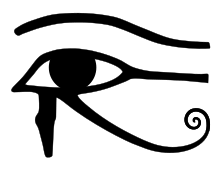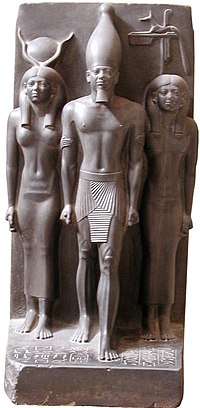Anput
Anput is a goddess in ancient Egyptian religion. Her name is written in hieroglyphs as jnpwt (reconstructed in Middle Egyptian as /ʔan.ˈpa.wat/ or /jan.ˈpa.wat/).[1] In English, her name is also rendered Anupet, Input, Inpewt and Yineput.[1] As the female version of her husband Anubis, who was known as jnpw to the Egyptians, Anput's name ends in a feminine "t" suffix.
| Anput | ||||||
|---|---|---|---|---|---|---|
 | ||||||
| Name in hieroglyphs | ||||||
| Symbol | jackal, canopic jars, mummy gauze | |||||
| Consort | Anubis | |||||
| Part of a series on |
| Ancient Egyptian religion |
|---|
 |
|
Beliefs |
|
Practices
|
|
Deities (list) |
|
Locations |
|
Symbols and objects
|
|
Related religions
|
|
|
She was often depicted as a pregnant or nursing jackal, or a jackal wielding knives. She is also depicted as a woman, with a headdress showing a jackal recumbent upon a feather. Probably the most notable example is that of the triad of Menkaure, Hathor and Anput. She was occasionally depicted as a woman with the head of a jackal, but this is very rare.[2]
Mythology
Anput is a female counterpart of the god Anubis.[3] She is also a goddess of the seventeenth nome of Upper Egypt.[4] She is also considered the protector of Osiris' body.
References
- Seawright, Caroline (October 8, 2001). "Anubis, God of Embalming and Guide and Friend of the Dead". Archived from the original on 8 January 2014. Retrieved 5 June 2017.
- Hill, J (2010). "Gods of ancient Egypt: Anput". Ancient Egypt Online. Retrieved 5 June 2017.
- Wilkinson, Richard H. (2003). The Complete Gods and Goddesses of Ancient Egypt. Thames & Hudson. p. 190
- DuQuesne, Terence (2007), Anubis, Upwawet, and Other Deities: Personal Worship and Official Religion in Ancient Egypt, p. 20
